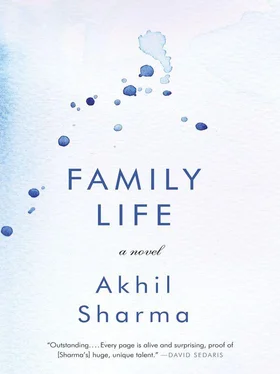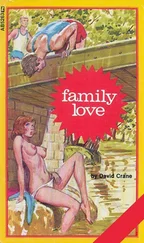My father stared at my brother. His face appeared swollen. He seemed stunned. I worried that he would complain. I wanted us to be dignified.
Later, in the afternoon, in the kitchen, the women sat at the table and cut vegetables and sang prayers. The men did heavier work. They installed two air conditioners and lifted the washer in the laundry room and placed it on bricks. From outside came the roar of a lawn mower as one of the men cut the grass. All this activity made our house feel like a temple being gotten ready for a festival, when the people of the neighborhood gather and mop the floor and string flowers into garlands. Having so many visitors gave me the sense that my family was important.
People kept arriving until nine or ten that night.
THE NEXT DAY began with a bath for Birju. I came downstairs around six. Birju was lying naked on his hospital bed. My father was rubbing him down with coconut oil.
We had given Birju sponge baths before but never a bath in a tub. “Hello, fatty,” I called out. I smiled. I walked boldly. I was nervous. The room was bright, and my mother was there, too, near the bed, spreading a towel over the back and seat of the wheelchair.
My mother looked over her shoulder at me. “Birju, say, ‘I’m your older brother. Speak with respect.’” She was smiling. She moved quickly, and her glass bracelets jingled as she smoothed the towel. Because I was pretending to be cheerful, I assumed she was acting, too.
I stood at the foot of the bed. Birju’s pubic hair was shaved to stubble. His stomach was a dome, and his G-tube, bound in a figure eight, resembled a ribbon on the side of a girl’s head. “Brother,” I said, “I have never met anyone as lazy as you. Making people bathe you.”
My mother, finishing with the towel, straightened herself. “Tell him, ‘I’m not lazy. I’m a king.’”
My father slipped his arms through Birju’s underarms. He pulled him up until Birju was half sitting. My father grinned. He leaned down and said into Birju’s ear. “Why are you so heavy? Are you getting up at night and eating? You are, aren’t you? Admit it. I see crumbs on your chin.”
I laughed. I grabbed Birju’s legs below the knees. My mother rolled the wheelchair next to the bed, and my father and I counted to three. We swung him into it. My father began pulling the wheelchair backward through the room. He pulled it out a doorway and across a narrow hall, into the bathroom.
The bathroom had a tub with a small bathing chair inside. My father put one leg into the tub and kept one leg out. He put his arms through Birju’s underarms. Again, we counted. “One, two, three.” My father yanked and twisted, and I lifted. We hefted and slid Birju onto the chair.
My father held an arm across Birju’s chest to keep him from toppling forward. I took a red mug and poured warm water over Birju’s head. He began to relax. His legs, which had been sticking out toward the tap, eased down. I poured water over his shoulders and arms. My father rubbed Birju’s neck with soap. He lathered his shoulders. Birju started urinating, a thick, strong-smelling, yellow stream. When Birju finished peeing, my father bent him forward. He shoved a bar of soap in the split between Birju’s buttocks. Gray water and flecks of shit dropped into the tub.
I chattered. “I dreamt I was fighting twenty people. I hit one. He fell over. I hit another. He fell over. It was fun.” I kept talking and talking. I was smiling, for I wished it to appear that I wasn’t seeing what was occurring before me.
Around noon, my father and I went to the pharmacy. This intimidated me. I had seen my father scream at my mother about how much things would cost. I was scared of spending money. I felt that once money was spent, it would be gone forever and couldn’t be replaced.
The pharmacy was on Main Street, a few shops from the train station. The store had a glass front. In the back was a high counter where one submitted one’s prescriptions and where the store owner sat.
I stood with outstretched arms near the counter. My father put a case of Isocal formula in my arms. Then he placed another on top of this.
“How do you want to pay?” the store owner said.
“Put it on my tab,” my father answered and to me, in Hindi, said, “Move.”
I turned around and began hurrying.
“No,” the store owner, a slender white-haired man with a goatee, called. I stopped and turned back around.
My father signed a receipt. He signed it with his left hand, the pen moving awkwardly and not making full contact with the paper. I believed he was signing with his left hand so that perhaps he could deny that it was his signature.
When we came back to the house, we had lunch. It was strange to eat on a plate at a table instead of, as at the nursing home, on a sheet of aluminum foil balanced on our pressed-together knees. All day that day, walking around the house barefoot, I noticed the feeling of the kitchen linoleum or the soft carpet of the living room and suddenly remembered that at the home I would be wearing shoes. Each time, the feeling of freedom was like the beginning of summer vacation, when one looks at a clock and is amazed, all over again, not to be in school.
I kept going to look at Birju, but I couldn’t get used to seeing him in an ordinary room in an ordinary house. Every time, I was startled.
Birju was restless. He ground his teeth, and his eyes darted around.
At some point in the late afternoon, I decided to go outside and throw a ball. This seemed like something any ordinary boy might do.
Outside, it was bright and humid. I stood in the center of our front lawn and flung a fluorescent green tennis ball straight into the air. It went higher than our brown shingle roof, and came down more slowly than it rose. The sky was so pretty and blue that it was like something from a cartoon. I caught the ball and spun in place. I threw it again and bent my knees catching it. I threw it one more time and tried catching the ball behind my back. I missed. The ball went bounding away.
I threw the ball over and over, sometimes with my left hand. When I did this, the ball went up at a slant.
Throwing the ball, I didn’t feel any better. I kept seeing Birju lying on his bed, his head tilted up, the white curtain on the window beside him rising and falling.
My tee shirt grew damp and stuck to my skin. Before long I wanted to go back inside, but to go inside felt like giving up. I stayed on the lawn and threw the ball.
THROUGH AN AGENCY we hired a nurse’s aide to read to Birju and exercise him. This aide came at eight in the morning and left at four. Another came at night, from ten until six. Then, after a week or two, miracle workers who said they could wake Birju began arriving. We were sometimes able to save money by dispensing with the day aide.
Some of the miracle workers were the same ones who had visited us in the nursing home. The first was Mr. Mehta. By profession, he was a petroleum engineer, but Mr. Mehta was unemployed. He would come at nine in the morning. Each of his visits started with him flinging a saffron-colored sheet over Birju, who lay on his exercise bed, a tall wooden platform that spent most of the day beneath the room’s chandelier.
After he straightened and smoothed the sheet, Mr. Mehta would kneel down beside Birju and begin to pray. He would pray for fifteen minutes or so, hands pressed tightly together. Slender, balding, dark-skinned, he always wore gray dress pants and black socks. The saffron sheet was printed with oms and swastikas. When Mr. Mehta finished praying, he would stand and begin to make his way around the bed, pulling out an arm or a leg from beneath the sheet and rubbing it vigorously till the hair stood on end. Once the hair was standing, he would put the limb back under the sheet. When he reached Birju’s head, he would rub his hands together and clap them to Birju’s ears. He’d cry, “Aum namah Shivaya.”
Читать дальше












